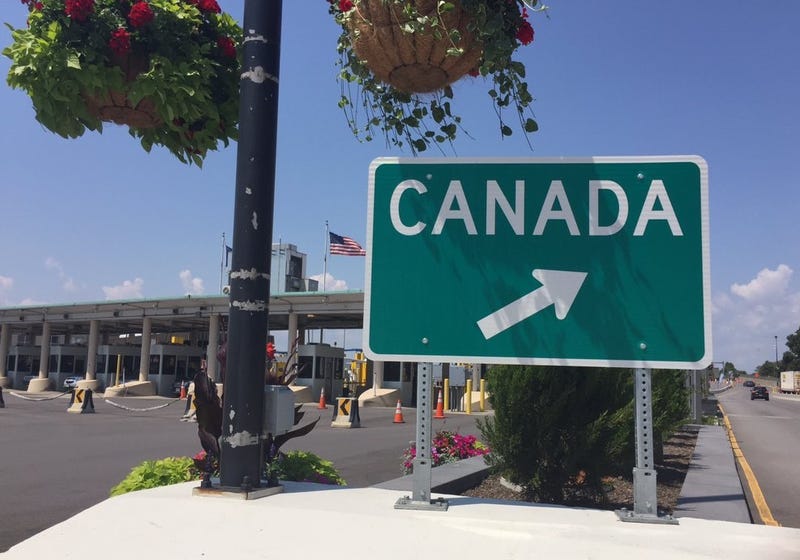
Buffalo, N.Y. (WBEN) — While issues at the U.S.-Canada border have certainly been better since the lifting of COVID-19 restrictions back in October, there are still a number of roadblocks that are slowing the access between borders for travelers.

While most of the past COVID-19 restrictions to travel between the two countries have been lifted, there are other issues that are hindering the access for many travelers, including issues with programs like NEXUS, that allows pre-screened travelers expedited processing when entering the United States and Canada.
Congressman Brian Higgins (NY-26) was back in Buffalo on Monday to introduce a new bill called the "Make NEXUS Work Act" that is geared towards allowing remote interviews to take place for people applying for a NEXUS pass or renewing their passes.
Although the process for people to be able to travel easily between the U.S.-Canadian border is improving as time goes on, will it ever return to normal?
"I think that's a benchmark that we want to exceed," said Congressman Brian Higgins (NY-26) on Monday. "I always believe that we do well, but I think we're doing it with one hand tied behind our backs, I think we can always do better. It accrues to the benefit of both Canada and the United States to have increased travel between the United States and Canada, and particularly at this Peace Bridge. So we're always striving."
Higgins says he remains in talks consistently with people from the Peace Bridge Authority like general manager Ron Rienas with the efforts to find ways to improve travel between borders, especially now with the access of technology and infrastructure. It all will hopefully lead to an easier experience for travelers trying to gain access to both the U.S. and Canada in the end.
"As I said before, the greatest inducement to travel is ease of travel, so always trying to find ways where we can improve. And we're finding that when technology is available, and it can be used for things like 'Making NEXUS Work Act', we should take advantage of that," Higgins said. "We should take advantage of infrastructure improvements that are being made at the Peace Bridge on a regular basis to make that experience better."
Back in late August, COVID-19 restrictions at the U.S.-Canadian border were still making it extremely difficult for travelers to freely go back-and-forth between the two countries. At that time, Congressman Higgins had not only called for the lifting of all COVID-19 restrictions, as it relates to the border, he also called for the review of post-9/11 restrictions.
While restrictions at the border relating to COVID-19 have since been lifted, that process to review the post-9/11 restrictions continues to be looked into.
"What typically happens when there's a crisis like 9/11, like the pandemic, you'd rather be safe than sorry. So I think restrictions are put in place, and then it's very, very difficult to pull those restrictions back," Higgins explained. "We are reviewing the restrictions that have been put in place since 9/11 and also the pandemic to find ways, like this, where we can utilize what's available to us today that wasn't available to us 20 years ago, that can make that cross-border experience better.
"I think there is still enormous potential that is unmet for both Buffalo, United States and Canada, as it relates to better use of the border, and more efficient use the border. It's kind of complicated. What people will do is they'll change their economic behavior to avoid the bridge altogether with too many restrictions in place, and we saw about a 40% reduction in traffic between the United States and Canada during the pandemic."
As it pertains to COVID-19 restrictions still in place, there are a number of recommended actions a traveler may want to take after flying. The only requirements, as it stands, remains with visiting certain areas of the world, travelers are required to show a negative COVID-19 test result taken no more than two days before boarding a flight to the United States. There is also an option for people who have documented recovery from COVID-19 in the past 90 days.
As for non-U.S. citizens or non-U.S. immigrants, valid proof of being fully vaccinated is required with the primary series of an accepted COVID-19 vaccine before boarding a flight to the United States.
Another Congressman who is hoping to see an end to COVID-19 mandates across the country is Congressman Nick Langworthy (NY-23), who was at the Buffalo-Niagara International Airport on Monday to announce two bills that will look to end COVID-19 mandates preventing federal employees and healthcare workers from returning to work.
When asked about the future of COVID-related travel restrictions, he admitted he doesn't know where things stand exactly in that process in Washington. However, he says it's about time to get back to reality all-around now that the COVID-19 emergency is over.
"I think that since we have plenty of data - even the CDC is walking back from his vaccine a little more every day - I think that we should really reevaluate anytime there's a mandate that involves a vaccine. I don't want to weaken border security, because obviously we have a border crisis, but this vaccine mandate has separated families between the U.S. and Canada. Us living on a bi-national border, we have not seen any real reason that this should continue on. I think it's an absolute waste, and enough is enough."
When it comes to other COVID-19 mandates like non-U.S. citizens needing valid proof of vaccination to cross the border, Langworthy adds he would support a removal of the mandate, but understands work will need to be done in Washington to try and abolishing these kinds of mandates.
"I think we should have to have some data to prove that this is, at all, a reason that we should be limiting people coming in. I mean, we need tough border security, but I don't think anyone's checking cards down at that Southern border right now while millions pour across it. Yet, there's husbands and wives, boyfriends and girlfriends, parents separated at the U.S.-Canadian border over a vaccine mandate. It's unconscionable."

However, COVID-19 restrictions for travel and border access may officially come to an end as of Monday with the White House announcing President Joe Biden's intentions of ending COVID-19 emergency declarations as of May 11, as the U.S. adjusts to living with virus.
In the meantime, work will continue to improve on other issues that hinder access to easier border travel between the U.S. and Canada. While Congressman Higgins says some changes may not be impending, they will come as other prior changes take place.
"If you're in a continuous improvement mode, you're gonna find that those opportunities, some of which we are aware of now like a project like this, proof of concept is already occurring under the Trusted Traveler Program," Higgins said. "So, anything planned? Not immediate, but we're always looking for ways to improve that situation."
Hear more from Higgins' press conference at the Peace Bridge on Monday available in the player below:



